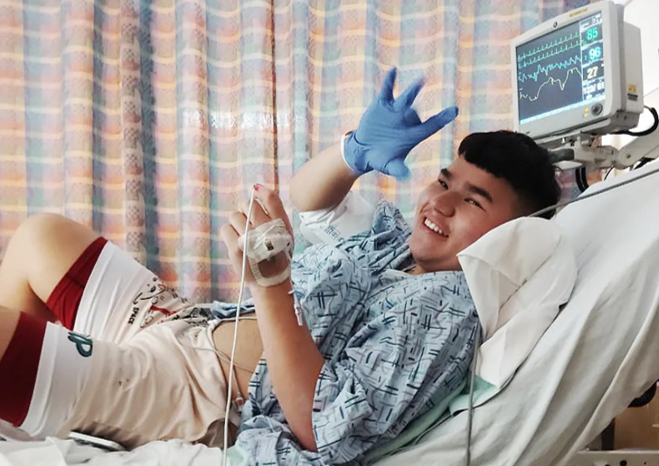Northeast News
By David Taylor / Managing Editor
For more than a decade, Scott Stephens has fought to make sure another Crosby parent doesn’t suffer the same outcome as his family when his son died of sudden cardiac arrest at the untimely age of 18 years old.
Stephens has appeared before the UIL Medical Advisory Committee, the Legislative Council, and 50 to 60 trips to Austin to make his plea to the legislature. Cody’s Law was finally passed and signed by Gov. Greg Abbott on Father’s Day weekend in 2019.
Stephens and the Cody Stephen’s Go Big or Go Home Memorial Foundation has continued its quest for screening athletes across the state of Texas at a feverish pace. That includes Cody’s home district where another life was recently saved.
“He was a student at Channelview High School and North Shore Rotary bought them a machine to screen students,” Stephens said. As far as he knew, they were supposed to be screening athletes.
It’s not the experience one mom had with her son.
Crosby ISD has a strict policy on screening athletes and Julia Pereida and her husband Rogelio had no idea how their life was about to change.
For Jullian Pereida, a young football player, life took an unexpected turn when he discovered he had hypertrophic cardiomyopathy (HCM), a serious heart condition. The diagnosis came after Jullian’s family moved to Crosby, where heart screening for athletes is mandatory.
Jullian, who had been playing football in Channelview, never had an ECG screening there, despite the school having the necessary equipment. It wasn’t until the family relocated to Crosby that Jullian underwent the mandatory heart screening, which revealed the abnormality.
The diagnosis was a shock to Jullian and his family.
“He has hypertrophic cardiomyopathy, HCM,” said Scott Stephens, a heart health advocate whose son died with a similar diagnosis. The condition means that Juju’s heart muscle is abnormally thick, which can lead to serious complications.
Jullian’s mother, Julia Pereida, expressed her gratitude for the mandatory screening in Crosby.
“I never thought to do it either, which I kicked myself in the butt for,” she said. The diagnosis has altered Jullian’s life significantly. He may never play football again, but the screening likely saved his life.
The Pereida family has faced numerous hospital stays and adjustments to their daily lives. Jullian now has a loop recorder implanted under his skin to monitor his heart. Despite the challenges, the family is grateful for the early detection and the care they have received.
Jullian’s story highlights the importance of mandatory heart screenings for young athletes. “Heart screening saves lives. I see evidence every day,” said Stephens. The Pereida family hopes that more schools will adopt similar policies to prevent other families from facing the same ordeal.
As Jullian navigates his new reality, he remains hopeful. While he may grieve the loss of his football career, he has a chance at a future he might not have had without the screening. His story is a testament to the life-saving power of early detection and the importance of advocating for mandatory heart screenings in schools.
Young athlete’s life takes a turn with heart condition diagnosis


